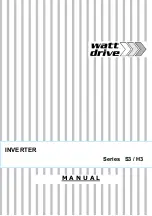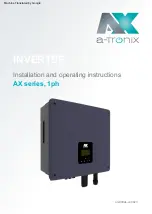
Do not invert neutral and phase when connecting the AC.
The shore or mains cable must be connected to the Multi with the aid of a three-wire 90ºC (194ºF) copper cable.
AC-in
AC-Out-1
AC-Out-2
Rated current
50 A
75 A
32 A
Recommend fuse or circuit breaker
50 A
75 A
32 A
Minimum wire gauge
AWG 6
AWG 6
AWG 10
The inverter does incorporate a mains frequency isolating transformer. This precludes the possibility of DC current at any AC port.
Therefore type A RCD’s can be used.
•
AC-in
The AC input cable can be connected to the terminal block ‘AC–in’.
From left to right: “N” (neutral), “L2” (phase 2), “PE” (earth) and “L1” (phase 1)
The AC input must be protected by a fuse or magnetic circuit breaker rated at 50A or less, and cable cross-section
must be sized accordingly.
If the input AC supply is rated at a lower value, the fuse or magnetic circuit breaker should be
down sized accordingly.
•
AC-out-1
The AC output cable can be connected directly to the terminal block ‘AC-out’.
From left to right: “N” (neutral), “PE” (earth) and “L” (phase)
With its PowerAssist feature the Multi can add up to 3 kVA (that is 3000 / 120 = 25 A) to the output during periods of peak
power requirement. Together with a maximum input current of 32 A this means that the output can supply up to 50 + 25 = 75 A
An earth leakage circuit breaker and a fuse or circuit breaker rated to support the expected load must be included in series with
the output, and cable cross-section must be sized accordingly. Victron Energy recommends to use the Blue Sea systems GFCI
circuit breakersPN. 309X or 310X. The maximum rating of the fuse or circuit breaker is 75 A.
•
AC-out-2
A second output is available that disconnects its load in the event of battery operation. On these terminals, equipment is
connected that may only operate if AC voltage is available on AC-in-1, e.g. an electric boiler or an air conditioner. The load on
AC-out-2 is disconnected immediately when the MultiPlus-II switches to battery operation. After AC power becomes available
on AC-in-1, the load on AC-out-2 will be reconnected with a delay of approximately 2 minutes. This to allow a genset to
stabilise.
4.4. Optional Connections
A number of optional connections are possible:
4.4.1. Remote Control
The product can be remotely controlled in two ways.
• With an external switch (connection terminal M, see appendix A). Operates only if the switch on the MultiPlus-II is set to “on”.
• With a Multi Control panel (connected to one of the two RJ45 sockets L, see appendix A). Operates only if the switch on the
MultiPlus-II is set to “on”.
4.4.2. Programmable relay
The product is equipped with a programmable relay.
The relay can be programmed for all kinds of other applications however, for example as a starter relay for a generator.
4.4.3. Programmable analog/digital input/output ports
The product is equipped with 2 analog/digital input/output ports.
These ports can be used for several purposes. One application is communication with the BMS of a lithium-ion battery.
4.4.4. Voltage sense (connection terminal J, see appendix A)
For compensating possible cable losses during charging, two sense wires can be connected with which the voltage directly on the
battery or on the positive and negative distribution points can be measured. Use wire with a cross-section of 0,75mm².
During battery charging, the MultiPlus-II will compensate the voltage drop over the DC cables up to a maximum of 1 Volt (i.e. 1V
over the positive connection and 1V over the negative connection). If the voltage drop threatens to become larger than 1V, the
charging current is limited in such a way that the voltage drop remains limited to 1V.
MultiPlus-II 48V 3kVA 120V
Page 13
Installation
















































